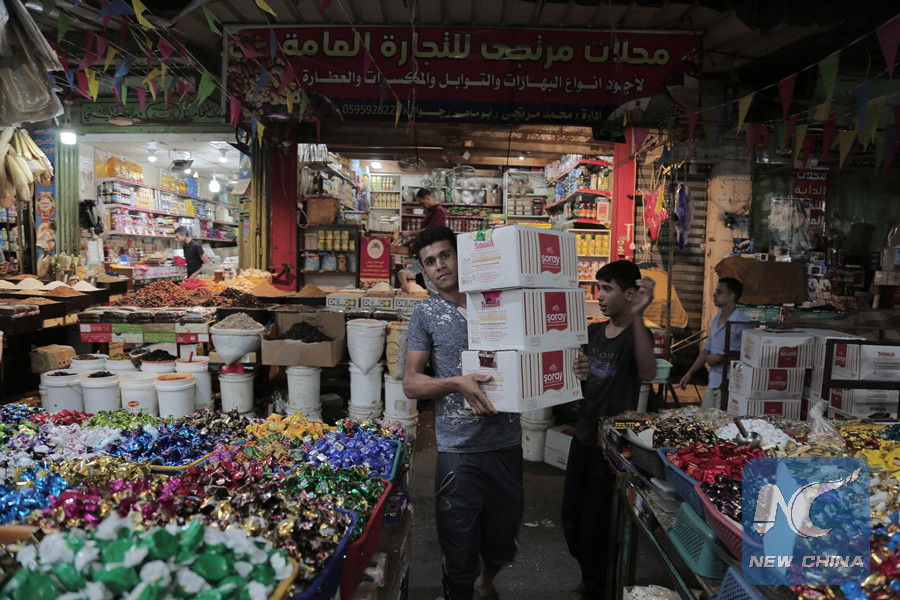
A Palestinian vendor sells sweets at a market ahead of the Eid al-Fitr in Gaza City, on June 11, 2018. Muslims around the world prepare for the Eid al-Fitr which marks the end of the fasting month of Ramadan. (Xinhua photo)
GAZA, June 13 (Xinhua) -- Ahead of Muslim festival of Eid al-Fitr, markets in the poverty-stricken Palestinian Gaza Strip looked overcrowded, but only few shoppers were really buying.
Local markets in Gaza witnessed a good turnout, with commercial activity reaching its peak days ahead of Eid al-Fitr, a three-day festival that Muslims worldwide celebrate the end of Ramadan, the holy month of fasting.
But the economy in Gaza is suffering recession due to 11-year Israeli blockade.
Muslims around the world prepare for this special holiday by buying desserts, pancakes and new clothes as well as exchanging family visits and offering gifts for family members and children.
However, celebrating the feast in Gaza has totally changed after Israel imposed blockade on the seaside enclave since 2007, when Islamic Hamas movement seized control of the strip after routing Palestinian Authority's forces.
The blockade has pushed Gaza's two million populations deeper into poverty as economists in Gaza point out that extreme poverty hit 53 percent in 2017 compared with 37 percent in 2011.
The coastal enclave has also been suffering from a political division that was caused by Hamas violent takeover of Gaza.
"The conditions in Gaza are very difficult...we can barely manage living," Nuha Awad, a mother in her 50s, told Xinhua.
Due to dire conditions, the lady, whose husband has been jobless for years, only bought a few things for her kids for the feast.
"I hope the world would show some mercy, we are really suffering here," she added as she left the old market in Gaza city.
It is not only difficult for those who have no jobs. Even those who work are also complaining of lack of money and high prices of goods.
Nour Abu-Alnada, 22-year-old, works as a street seller for 15 hours a day and can only earn 15 Shekels (less than 4 U.S. dollars) per day.
"This is not even enough to meet my daily needs," the young man complained.
He also said that salary cuts in government employees' salaries, which reached 50 percent of salaries and have been ongoing for more than one year, made things even worse.
"We are suffering from a slow death," Abu-Alnada added.
According to the Palestinian Central Bureau of Statistics, unemployment in Gaza Strip reached 43.9 percent compared with 17.9 percent in the West Bank.
The failing economic conditions have had a worse impact on Gaza merchants who had to lower goods prices to attract shoppers.
Most Gaza traders have refrained from buying more goods ahead of the feast this year in light of the ongoing economic deterioration.
"Shoppers visit the market in large numbers, but they don't buy much," owner of cloths shop in Omar al-Mukhtar market in Gaza city, Amjad Abu Lwaik, told Xinhua.
"I know many traders and importers who preferred not to buy new goods lest they should not be able to sell them," he added as his eyes rolled in search for customers.
"The selling movement has declined by 70 percent compared to the past few years," the seller said.
Maher al-Tabaa, media official in the Gaza Commerce Chamber, said the Gaza Strip is going through the worst economic conditions this year.
"All economic indicators show that the economic situation in Gaza is disastrous," he said, adding that unemployment rates in the Gaza Strip exceeded 49 percent during the first quarter of this year.
Al-Tabaa also revealed that food insecurity rate in the Gaza Strip reached 72 percent.

